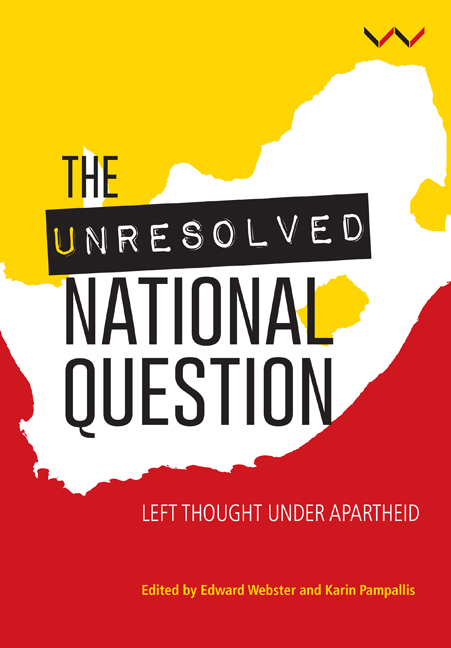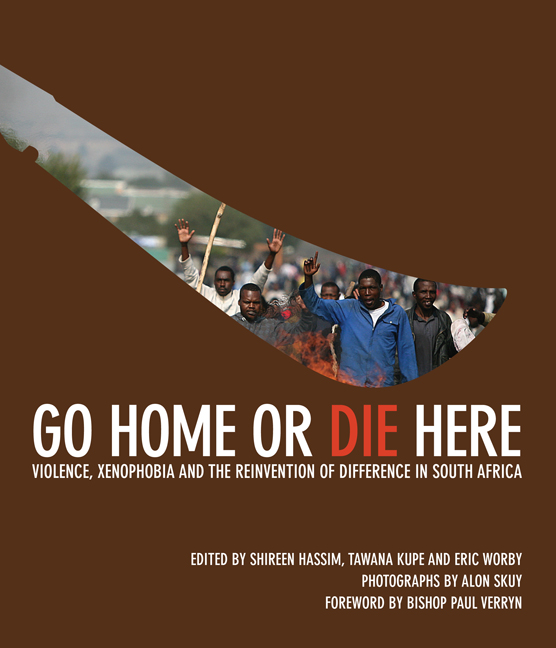18 results
South Africa, 1994 + 30: A Conversation About History After Apartheid
-
- Journal:
- The Journal of African History , First View
- Published online by Cambridge University Press:
- 24 April 2024, pp. 1-18
-
- Article
-
- You have access
- Open access
- HTML
- Export citation
How Jacob Zuma Revitalized Feminism in South Africa
-
- Journal:
- Politics & Gender , First View
- Published online by Cambridge University Press:
- 22 February 2023, pp. 1-5
-
- Article
- Export citation

The Unresolved National Question in South Africa
- Left thought under apartheid and beyond
-
- Published by:
- Wits University Press
- Published online:
- 21 April 2018
- Print publication:
- 31 December 2017
Contents
-
- Book:
- The Unresolved National Question in South Africa
- Published by:
- Wits University Press
- Published online:
- 21 April 2018
- Print publication:
- 31 December 2017, pp v-vi
-
- Chapter
- Export citation
Index
-
- Book:
- The Unresolved National Question in South Africa
- Published by:
- Wits University Press
- Published online:
- 21 April 2018
- Print publication:
- 31 December 2017, pp 301-310
-
- Chapter
- Export citation
PART TWO - CONTINUITY AND RUPTURE
-
- Book:
- The Unresolved National Question in South Africa
- Published by:
- Wits University Press
- Published online:
- 21 April 2018
- Print publication:
- 31 December 2017, pp 111-111
-
- Chapter
- Export citation
Acronyms and Abbreviations
-
- Book:
- The Unresolved National Question in South Africa
- Published by:
- Wits University Press
- Published online:
- 21 April 2018
- Print publication:
- 31 December 2017, pp vii-ix
-
- Chapter
- Export citation
PART ONE - KEY FOUNDATIONAL TRADITIONS
-
- Book:
- The Unresolved National Question in South Africa
- Published by:
- Wits University Press
- Published online:
- 21 April 2018
- Print publication:
- 31 December 2017, pp 19-19
-
- Chapter
- Export citation
Biographical Notes
-
- Book:
- The Unresolved National Question in South Africa
- Published by:
- Wits University Press
- Published online:
- 21 April 2018
- Print publication:
- 31 December 2017, pp 297-300
-
- Chapter
- Export citation
Frontmatter
-
- Book:
- The Unresolved National Question in South Africa
- Published by:
- Wits University Press
- Published online:
- 21 April 2018
- Print publication:
- 31 December 2017, pp i-iv
-
- Chapter
- Export citation
Chapter 12 - Postponing the National Question: Feminism and the Women's Movement
- from PART TWO - CONTINUITY AND RUPTURE
-
-
- Book:
- The Unresolved National Question in South Africa
- Published by:
- Wits University Press
- Published online:
- 21 April 2018
- Print publication:
- 31 December 2017, pp 217-234
-
- Chapter
- Export citation
8 - Perverse consequences? The impact of quotas for women on democratization in Africa
-
-
- Book:
- Political Representation
- Published online:
- 05 June 2012
- Print publication:
- 14 January 2010, pp 211-235
-
- Chapter
- Export citation
Introduction
-
-
- Book:
- Go Home or Die Here
- Published by:
- Wits University Press
- Published online:
- 04 June 2019
- Print publication:
- 01 November 2008, pp 1-26
-
- Chapter
- Export citation
Frontmatter
-
- Book:
- Go Home or Die Here
- Published by:
- Wits University Press
- Published online:
- 04 June 2019
- Print publication:
- 01 November 2008, pp i-vi
-
- Chapter
- Export citation

Go Home or Die Here
- Violence, Xenophobia and the Reinvention of Difference in South Africa
-
- Published by:
- Wits University Press
- Published online:
- 04 June 2019
- Print publication:
- 01 November 2008
Author Biographies
-
- Book:
- Go Home or Die Here
- Published by:
- Wits University Press
- Published online:
- 04 June 2019
- Print publication:
- 01 November 2008, pp 254-259
-
- Chapter
- Export citation
End Notes
-
- Book:
- Go Home or Die Here
- Published by:
- Wits University Press
- Published online:
- 04 June 2019
- Print publication:
- 01 November 2008, pp 242-253
-
- Chapter
- Export citation
Table of Contents
-
- Book:
- Go Home or Die Here
- Published by:
- Wits University Press
- Published online:
- 04 June 2019
- Print publication:
- 01 November 2008, pp vii-vii
-
- Chapter
- Export citation



